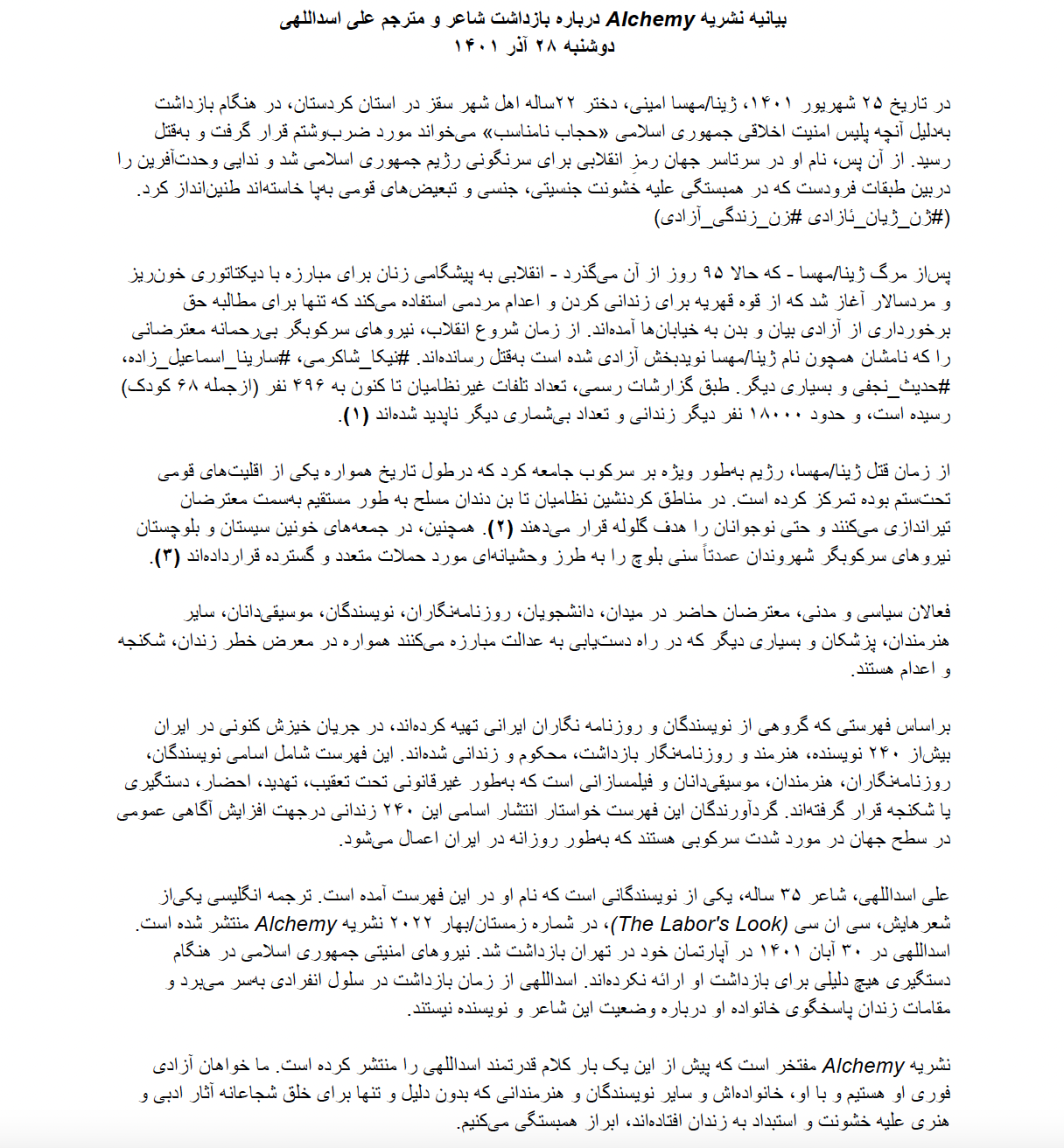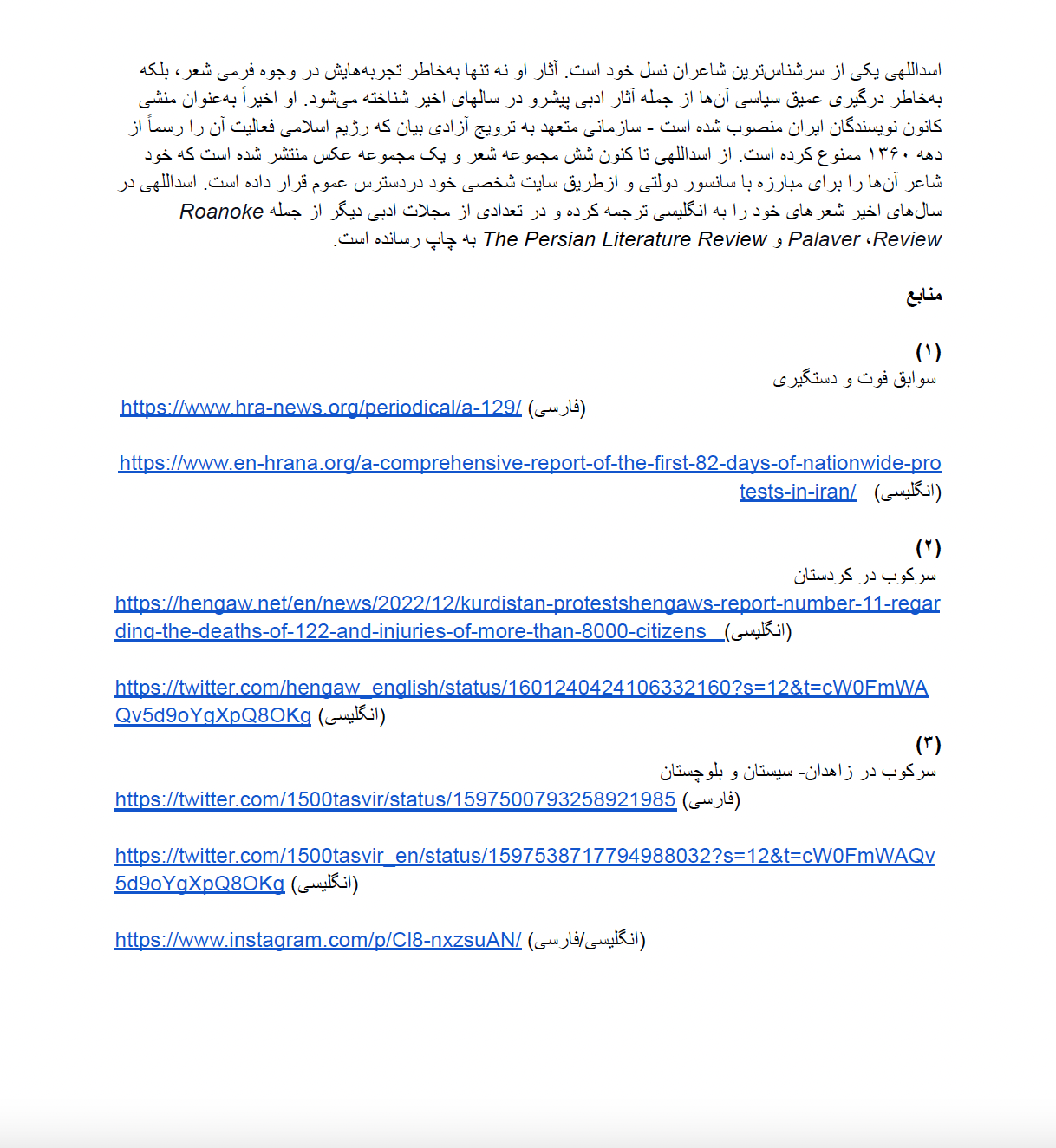Statement on the Imprisonment of Poet & Translator Ali Asadollahi
*February 2023 Update*
Ali Asadollahi was released from Fashafuye Prison (Great Tehran Penitentiary) on the evening of February 23, 2023. Ali spent more than 30 days in solitary confinement under interrogation for accepting the charge of “collusion against national security” and “propaganda against the state” before he was transferred to Fashafuye Prison. He was released without a formal explanation along with several others imprisoned without cause during the protests in Iran that have been ongoing since 2022.
*December 2022 Statement*
Monday, December 19, 2022
On September 16, 2022, Jina/Mahsa Amini, a 22-year old woman from Saqqez, Kurdistan, was beaten to death by police while in custody at Vozara Detention Center for wearing “inappropriate attire.” Her name and memory continue to echo around the globe as a revolutionary call for an end to the Iranian regime, and as a unifying force for working class Iranians who stand in solidarity against gender-based and sexual violence and discrimination against minoritized ethnicities (#JinJiyanAzadi, #WomanLifeFreedom).
Following Jina/Mahsa’s death—for 95 days now—the woman-led revolution in Iran has taken to the streets to fight against a violent patriarchal dictatorship that uses military force to execute and imprison people for exercising their right to the freedom of their own bodies and voices. Since the revolution began, guards have ruthlessly murdered protestors and bystanders whose names echo as Jina/Mahsa’s does. #NikaShakarami, #SarinaEsmaeilzadeh, #HadisNajafi, among so many others. The official reported civilian death toll has reached 496 (including 68 minors), but around 18,000 more are imprisoned and countless others have disappeared (1).
Since the murder of Jina/Mahsa, the regime has especially cracked down on the Indigenous Kurdish population, a historically oppressed ethnic minority in Iran. Heavily armed guards continue to open-fire on Kurdish protesters, targeting teenagers (2). Sistan Baluchistan—where weekly protests have become known as “Bloody Fridays”—has also been especially hard-hit by the government crackdown due to ongoing discrimination against Sunni Baloch citizens (3).
Activists and protesters on the ground, as well as students, journalists, writers, musicians, artists, doctors, and others fighting for justice are in immediate danger of imprisonment, torture, and execution.
Based on a list assembled by a group of Iranian writers and journalists, more than 240 writers, artists, and journalists have been detained, sentenced, and imprisoned during the ongoing protests in Iran. This list consists of the names of writers, journalists, artists, musicians, and filmmakers who were illegally persecuted, threatened, summoned for persecution, arrested, or tortured. The creators of the list demand the publicity of the names of these 240 prisoners to raise global public awareness about the profound depths of suppression exerted in Iran on a daily basis.
Ali Asadollahi, a 35-year-old poet is one of the writers on that list. His autotranslation, The Labor’s Look, was published in Alchemy’s Winter/Spring 2022 issue. Asadollahi was arrested in his apartment in Tehran on November 21, 2022. He was imprisoned without cause by Islamic Republic guards and has been held in solitary confinement since his arrest; the prison authorities refuse to answer his family’s inquiries about his status.
Alchemy is proud that Asadollahi’s powerful words are a part of our publication. We call for his immediate release and stand in solidarity with him, his family, and the other writers and artists who have been imprisoned without cause for bravely speaking out against authoritarian violence and oppression through their creative work.
Asadollahi is one of the most celebrated poets of his generation. His works are known as progressive not only for their experimentation with poetic form, but also for their in-depth political engagement. He was recently appointed as secretary of the Iranian Writers’ Association—an organization committed to promoting freedom of speech that was officially banned in the 1980s by the Islamic regime. Asadollahi has published six poetry books and a collection of photographs, which are all made available to the public by the author through his website as an act of resistance against state censorship. Asadollahi has translated his poems into English in recent years and has published them in a number of other literary journals, including Roanoke Review, Palaver, and The Persian Literature Review.
Sources:
(1) Death records and arrest records:
(Persian) https://www.hra-news.org/periodical/a-129/
(English) https://www.en-hrana.org/a-comprehensive-report-of-the-first-82-days-of-nationwide-protests-in-iran/
(2) Crackdowns in Kurdistan:
(English) https://hengaw.net/en/news/2022/12/kurdistan-protestshengaws-report-number-11-regarding-the-deaths-of-122-and-injuries-of-more-than-8000-citizens
https://twitter.com/hengaw_english/status/1601240424106332160?s=12&t=cW0FmWAQv5d9oYgXpQ8OKg
(English) https://twitter.com/hengaw_english/status/1595392804787818498?s=12&t=cW0FmWAQv5d9oYgXpQ8OKg
(3) Crackdowns in Zahedan, Sistan-Baluchestan:
(Persian) https://twitter.com/1500tasvir/status/1597500793258921985
(English) https://twitter.com/1500tasvir_en/status/1597538717794988032?s=12&t=cW0FmWAQv5d9oYgXpQ8OKg
(English/Persian) https://www.instagram.com/p/Cl8-nxzsuAN/
Pronunciamiento: Encarcelamiento del poeta y traductor Ali Asadollahi el 21 de noviembre de 2022
El 16 de septiembre del 2022, Jina/Mahsa Amini, una mujer de 22 años de Saqqez, Kurdistan, fue asesinada a golpes por la policía mientras se encontraba en custodia en el Centro de detención de Vozara por el cargo de vestir “atuendo inapropiado.” Su nombre y su memoria continúan resonando en todo el mundo como un llamado a poner fin al régimen iraní, y unificar la fuerza de la clase trabajadora de Iran que han sido solidarios contra la violencia sexual y de genero contra las minorías étnicas (#JinJiyanAzadi, #WomanLifeFreedom).
Tras el asesinato de Jina/Mahsa, hace 95 días, la revolución liderada por las mujeres de Iran, se ha pronunciado en las calles para luchar contra la violencia de una dictadura patriarcal que usa la fuerza militar para asesinar y encarcelar a personas por ejercitan sus derechos a decidir libremente sobre sus cuerpos y sus voces. Desde el comienzo de la revolución, guardias han asesinado a manifestantes y espectadores. Sus nombres resuenan junto al de Jina/Mahsa. #NikaShakarami, #SarinaEsmaeilzadeh, #HadisNajafi, entre muches otres. El reporte oficial de muertos ha alcanzado cuatrocientos noventa y seis (incluyendo a sesenta y ocho menores) sin embargo el número en prisión oscila entre los diez y ocho mil mientras que muchas más personas han desparecido (1).
Desde el asesinado de Jina/Mahsa, el régimen ha dirigido violencia contra la población indígena Kurda, quienes históricamente han sido una minoría étnica oprimida en Iran. Guardias fuertemente armados continúan abriendo fuego contra manifestantes kurdos, la mayoría adolescentes (2). En Sistan Baluchistan, el gobierno ha tomado medidas severas para dispersar manifestaciones semanales––que se han convertido en masacres ahora conocidas como “Viernes Sangrientos”–– y detener a personas que se identifican como Sunni Baloch (3).
Activistas y manifestantes en la barricada, así como estudiantes, periodistas, escritores, músicos, artistas, doctores y otros que luchas por obtener justicia se encuentran en peligro de ser arrestados, encarcelados, torturados y asesinados.
En base a una lista recopilada por un grupo de escritores y periodistas iranies, más de 240 escritores, artistas y periodistas ha sido detenidos, sentenciados y encarcelados durante la actual protesta en Iran. Esta lista consiste en nombre de escritores, periodistas, artistas, músicos y cineastas que han sido ilegalmente perseguidos, amenazados, culpados, arrestados y torturados. Los creadores de esta lista demandan que los nombres de estos 240 prisioneros sean revelados públicamente para informar a la comunidad internacional sobre la profunda opresión ejercitada diariamente en Iran.
Ali Asadollahi, un poeta de 35 años es uno de los escritores en esa lista. Su autotraducción, The Labor’s Look, fue publicada por Alchemy en su edición de Winter/Spring 2022. El 21 de noviembre del 2022, Asadollahi fue arrestado en su domicilio en Tehran. Él fue encarcelado injustamente por guardias de la Republica Islámica y desde su arresto ha sido forzado a permanecer aislado. Mientras tanto y ante las indagatorias de su familia, las autoridades se han negado a proporcionar información sobre su estatus.
En Alchemy nos enorgullece haber publicado las poderosas palabras de Asadollahi y hacemos aquí un llamado para su inmediata liberación. Nos solidarizamos con él, su familia, y el resto de los escritores y artistas que han sido injustamente encarcelados por hablar con valor, a través de su trabajo, en contra de la violencia autoritaria y represiva.
Asadollahi es uno de los poetas más célebres de su generación. Su trabajo es reconocido no solo por su progresista cualidad experimental usando formas poéticas, pero también por su exhaustivo involucramiento político. Hace poco fue nombrado secretario de la Asociación Iraní de Escritores––una organización comprometida con la promoción de la libertad de expresión oficialmente censurada por el régimen islámico en los años 80. Asadollahi ha publicado seis libros de poesía y una colección de fotografías, todos disponibles gratuitamente por el autor a través de su sitio web que sirve cómo un acto de resistencia contra la censura de estado. Recientemente Asadollahi ha traducido y publicado sus poemas en inglés en varias revistas literarias incluidas Roanoke Review, Palaver, and The Persian Literature Review.
Referencias:
(1) Registro de arrestos y muertes
(persa) https://www.hra-news.org/periodical/a-129/
(inglés) https://www.en-hrana.org/a-comprehensive-report-of-the-first-82-days-of-nationwide-protests-in-iran/
(2) Represión en Kurdistan
https://twitter.com/hengaw_english/status/1601240424106332160?s=12&t=cW0FmWAQv5d9oYgXpQ8OKg
(3) Represión en Zahedan, Sistan-Baluchestan
(persa) https://twitter.com/1500tasvir/status/1597500793258921985
(inglés) https://twitter.com/1500tasvir_en/status/1597538717794988032?s=12&t=cW0FmWAQv5d9oYgXpQ8OKg
(inglés/persa) https://www.instagram.com/p/Cl8-nxzsuAN/
Şair ve Tercüman Ali Asadollahi’nin Tutuklanması Hakkında Bildiri
16 Eylül 2022’de İran Kürdistan’ı Sakkız bölgesinden gelen Jina/Mahsa Amini adlı genç kadın ‘uygunsuz kıyafet’ gerekçesiyle tutulduğu Vozara Gözaltı Merkezi’nde ölümüne dövülerek yaşamını yitirdi. Amini’nin adı ve hatırası İran rejiminin sona erdirilmesine yönelik devrimci bir çağrı olarak, ve cinsel ve toplumsal cinsiyete ve de azınlıklaştırılmış etnik gruplara uygulanan ayrımcılığa dayalı şiddete karşı dayanışma içinde duran İran emekçilerinin birliğini sağlamasıyla tüm dünyada yankılanmaya devam ediyor (#JinJiyanAzadi, #WomanLifeFreedom, #KadınYaşamÖzgürlük).
Jina/Mahsa’nın katledilmesini takiben kadınların öncülüğündeki İran devrimi tam 95 gündür, kendi sesleri ve bedenlerine dair özgürlüklerini kullanan insanları askeri güç yoluyla hapseden ve katleden bu ceberrut ataerkil diktatörlüğe karşı mücadele etmek üzere sokaklara taşmış durumda. Devrim başladığından beri rejim muhafızlarının insafsızca katlettikleri protestocuların ve sıradan insanların isimleri tıpkı Jina/Mahsa’nınki gibi yankılanmaya devam ediyor. #NikaShakarami, #SarinaEsmaeilzadeh, #HadisNajafi gibi yüzlercesi. Resmi raporlara göre sivil ölümleri 496’ya (68 tanesi reşit değil), tutuklu sayısı ise 18,000’e varmış durumda. Bir de sayısız kayıp edilen kişiler var (1).
Jina/Mahsa’nın katledilmesinden bu yana rejim özellikle zaten tarihsel olarak İran’da baskı altında yaşamış bir etnik azınlık olan Kürt nüfusa yönelik sert önlemler uygulamakta. Ağır silahlı muhafızlar Kürt protestoculara özellikle de gençleri hedef alarak ateş açmaya devam ediyor (2). Haftalık gösterilerin ‘Kanlı Cumalar’ adını aldığı Sistan-Belucistan da yine burada yaşayan Sünni Beluç vatandaşlara yönelik sürekli ayrımcılık sebebiyle özellikle sert önlemlerin alındığı bir bölge konumunda (3).
Alandaki aktivist ve göstericiler ile öğrenciler, gazeteciler, yazarlar, müzisyenler, sanatçılar, doktorlar ve adalet için mücadele eden diğer herkes doğrudan tutuklanma, işkence ve katledilme tehdidi ile karşı karşıya.
İranlı bir grup yazar ve gazetecinin oluşturduğu bir listeye göre 240’ı aşkın yazar, sanatçı ve gazeteci halen süren protestolar sırasında tutuklanmış, hüküm giymiş, ve hapsedilmiş durumda. Bu liste yasadışı olarak zulmedilen, tehdit edilen, tutuklanan veya işkence gören yazar, gazeteci, sanatçı, müzisyen ve sinemacıların isimlerini içeriyor. Listeyi hazırlayanlar bu 240 kişinin isimlerinin İran’da gündelik olarak uygulanan derin baskı rejimi konusunda küresel toplum nezdinde farkındalık sağlamak amacıyla yaygın şekilde duyurulmasını talep ediyorlar.
35 yaşındaki İranlı şair Ali Asadollahi bu listedeki isimlerden biri. ‘Emeğin Bakışı’ adlı eserinin İngilizce çevirisi Alchemy dergisinin 2022 Kış/İlkbahar sayısında yayınlanmıştı. Asadollahi 21 Kasım 2022’de Tahran’daki apartmanında gözaltına alındı. İslam muhafızları tarafından gerekçe gösterilmeden tutuklanan şair, içeri alındığından bu yana hücre hapsinde tutuluyor. Cezaevi yetkilileri şairin ailesinin sorgu ve taleplerine cevap vermeyi reddediyorlar.
Alchemy dergisi olarak Asadollah’ın derin tesirli sözlerini yayınlamaktan gurur duyuyoruz. Şairin hemen salıverilmesini talep ediyor ve kendisi, ailesi, ve yaratıcı çalışmalarıyla otoriter şiddet ve baskıya karşı cesurca ses çıkaran diğer yazar ve sanatçılar ile dayanışma içinde olduğumuzu duyuruyoruz.
Asadollahi kendi jenerasyonunun en tanınınmış şairlerinden biridir. Çalışmalarının ilerici olarak nitelendirilmesi hem şiir biçimine dair deneysel yaklaşımlarından hem de derin siyasi angajmanlarından kaynaklanıyor. Kendisi yakın zamanda İran Yazarlar Birliği sekreteri olarak atanmıştı. Bu organizasyon İran’da 1980’lerden beri yasaklanmış olan ifade özgürlüğü konusundaki mücadelesi ile tanınıyor. Asadollahi’nin yayınlanmış altı kitabı ve fotoğraf koleksiyonu bulunmakta. Bunların hepsi şair tarafından rejimin baskısına karşı direniş amaçlı olarak kendi websitesinde kamunun erişimine açılmış durumda. Asadollahi son yıllarda şiirlerini İngilizceye çevirmekte ve Roanoke Review, Palaver, ve The Persian Literature Review gibi diğer bazı edebiyat dergilerinde yayınlamaktaydı.
Kaynaklar:
(1) Ölüm ve tutukluluk raporları:
(Farsça) https://www.hra-news.org/periodical/a-129/
(İngilizce) https://www.en-hrana.org/a-comprehensive-report-of-the-first-82-days-of-nationwide-protests-in-iran/
(2) Kürdistan’daki baskılar
(İngilizce) https://hengaw.net/en/news/2022/12/kurdistan-protestshengaws-report-number-11-regarding-the-deaths-of-122-and-injuries-of-more-than-8000-citizens
https://twitter.com/hengaw_english/status/1601240424106332160?s=12&t=cW0FmWAQv5d9oYgXpQ8OKg
(İngilizce) https://twitter.com/hengaw_english/status/1595392804787818498?s=12&t=cW0FmWAQv5d9oYgXpQ8OKg
(3) Zahidan, Sistan-Belucistan’daki Baskılar
(Farsça) https://twitter.com/1500tasvir/status/1597500793258921985
(İngilizce) https://twitter.com/1500tasvir_en/status/1597538717794988032?s=12&t=cW0FmWAQv5d9oYgXpQ8OKg
(İngilizce/Farsça) https://www.instagram.com/p/Cl8-nxzsuAN/


